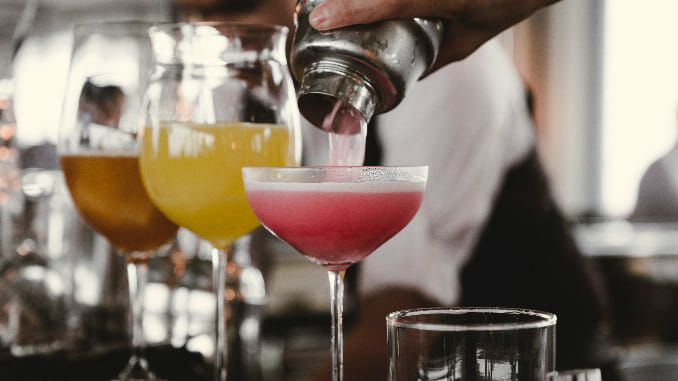Drinking Dry in Dubai: At the Heart of the Middle East’s New Cocktail Culture
Photo by Helena Yankovska/Unsplash
“We have this word in Italian, sfigato, which comes to mind when one goes into a bar and asks for a non-alcoholic drink. It translates to ‘an unlucky person…’ but we live in the Middle East, of course.”
So begins my conversation with Giovanni Depergola, a mixologist who has called Dubai home for over a decade. As for his passion for beverages, be they alcoholic or otherwise? Palpable. Not only is he a certified sake sommelier and Qualified Learning Facilitator from Ecole hôtelière de Lausanne, but he’s also the instructor of Dry Mixology and Bartending courses at the International Centre for Culinary Arts. Additionally, Depergola co-founded Alembic, a creative beverage agency specializing in everything from the consumer experience to the education of hospitality staff. Needless to say, he’s a busy man.
“We are bartenders at the end of day, but we like to be called mixologists so we can charge more,” he says with a chuckle. “I’m also an educator, so for me, training is a very serious matter. My passion for dry mixology stems from the passion that I have for cocktails—all that showmanship, all that theatricality deserves a spot in the non-alcoholic category.” As a food and beverage industry insider, Depergola says he couldn’t help but address the gap in the market. “All I saw was carbonated drinks and canned juices, which got me thinking, ‘We’re good at making cocktails, so why not use the same flavors, the same glassware, the same shaking techniques to serve something that we are proud of?’ I wasn’t proud to serve something in a can with ice and a slice of lemon.”
In no time, people across Dubai (many for whom total abstinence is a way of life) were engaging with his creations under the “Cocktail Zero” category, a brand of alcohol-free designer drinks now registered with Alembic. It’s no secret that consumption of non-alcoholic drinks is on the rise globally, but arguably, they’re most favored in the Middle East, owing not only to cultural and religious aspects but also a move toward a healthier lifestyle—and the pandemic has only accelerated this trend.
Factor in the region’s well-documented obsession with social media, and the days of sodas and saccharine mocktails appearing on the last page of a menu are gradually on the way out. Now, they’re Insta-worthy and well thought-out and boast complex flavors suited to the adult palate. A closer look also reveals the use of downright unexpected ingredients—dehydrated grapefruit, pistachio orgeat and rosemary sprigs sprayed with gold dust included. But why now? In a country where non-drinkers never expected a dedicated drinks menu that caters to them, what changed? Two words: Drink Dry.
-

-

-

-

-

-

-

-

-

-

-

-

-

-

-

-

-

-

-

-

-

-

-

-

-

-

-

-

-

-

-

-

-

-

-

-

-

-

-

-








































